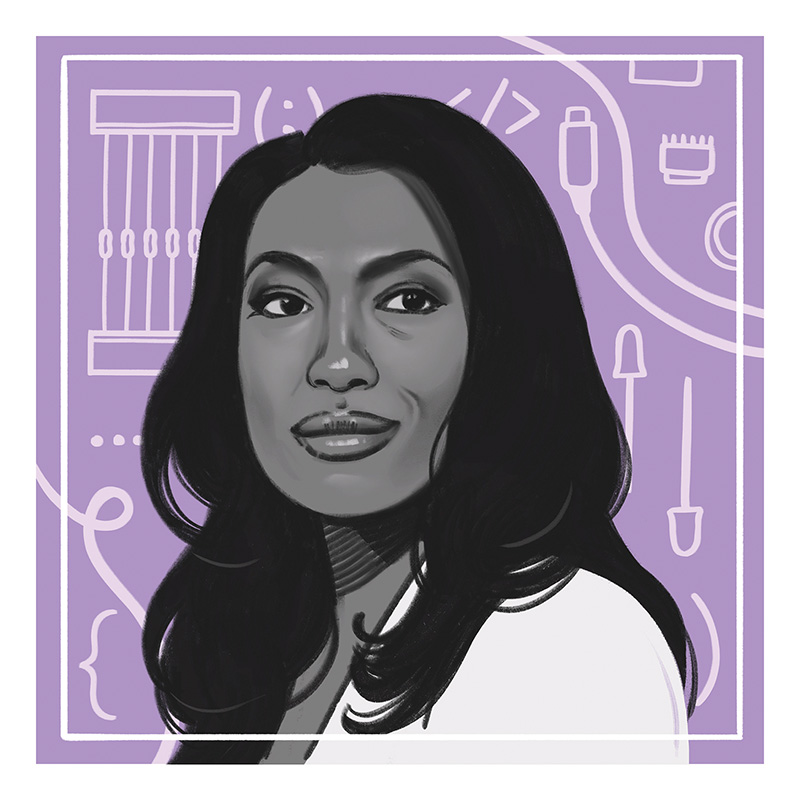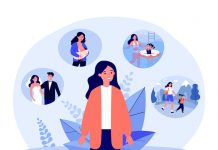
By the age of 35, Aisha Bowe had climbed Mount Kilimanjaro, worked as an aerospace engineer for NASA, and founded a tech company. The U.S. Women’s Chamber of Commerce named her an “emerging star” and lauded her efforts to fight to encourage women and people of color to go into STEM — science, technology, engineering, and math — fields.
Not bad for an Ann Arbor kid whose less-than-perfect academic performance prompted a guidance counselor at Pioneer High School to suggest she pursue a career in cosmetology. Bowe’s father, a Bahamian who paid for his own engineering degree by driving a taxi, encouraged her to imagine something more.
She did. She earned an undergraduate degree in aerospace engineering and a master’s degree in space systems engineering at the University of Michigan, worked for NASA for a few years, and then launched STEMBoard, a tech company that collaborates with historically Black colleges and universities to expose more students to STEM. Her latest endeavor, Lingo, is an at-home coding kit for students. The packaging, bathed in maize and blue, is a nod to her alma mater.
Bowe spoke with ∫⁄¡œÕ¯ Detroit about how her Michigan education and upbringing influenced her career trajectory in STEM and how she‚Äôs working to encourage other young women and people of color to join a field long dominated by white men.Ã˝
∫⁄¡œÕ¯ Detroit: Did you always want to be an engineer? Ã˝
Aisha Bowe: In high school, I was unfocused and lacked confidence, which is perhaps why my guidance counselor suggested cosmetology. I mention this not because there‚Äôs anything wrong with that field. But I like to make people aware that younger individuals ‚Äî especially children ‚Äî will internalize what adults think their future looks like. I have spent years urging others not to place limitations on the boundaries of someone‚Äôs future based off what you see solely before you on paper. Oftentimes, paper is only part of the story.Ã˝
Were others in Michigan more encouraging of your career path?Ã˝ Ã˝
After I graduated from Pioneer, I went to Washtenaw Community College. The guidance and support I received at Washtenaw really challenged me to say, ‚ÄúHey, you‚Äôre good at this work.‚Äù They believed I could do it and provided me with the support network to transition to the University of Michigan and really take hold of my life.Ã˝
Not too long after that, you were at NASA.Ã˝
If you told me 10 years ago that I would have had the joy of being a NASA aerospace engineer working to make the National Airspace System safer and more efficient for the flying public, I would have been like, ‚ÄúWow.‚ÄùÃ˝ But then I decided to take that expertise and found the organization I‚Äôve now operated for eight years. Before, I would have just thought that was a dream. ‚ÄúThere‚Äôs no way,‚Äù I would‚Äôve said.Ã˝
What does STEMBoard do?Ã˝
The company is broken into two parts. We provide engineering services for the federal government in data analytics, geospatial visualizations, and IT services. We also work with academic institutions, universities, and national nonprofits to cultivate the emerging workforce, which is essentially STEM outreach, advocacy, and curriculum development. On our staff, we have historically Black colleges represented; we have Ivy League institutions represented. I recognize that what I’m trying to do is a hard thing. And it’s impossible to do hard things without the diversity of input.
Have you seen advancements in diversity in STEM during your time in the field?Ã˝
When I was younger, I never saw women ‚Äî let alone women of color ‚Äî in technical careers. For me now, every day, I wake up and I can look on Instagram, or I can turn on a channel on TV, and I can see women and minorities represented in the STEM field. That alone represents progress.Ã˝
Last year, after the killing of George Floyd, followed by a summer of Black Lives Matter protests, the country began a new reckoning with racism. Many companies have since pledged to improve diversity in hiring practices. Will this make a difference?Ã˝ Ã˝
It‚Äôs really powerful to start to have the conversation around what is needed in order to get to a more inclusive environment. When I think about diversity, I really like to take a step back. Let‚Äôs just take race and gender out of it for a moment, and let‚Äôs talk about what we experienced in the pandemic. We need more doctors to work on vaccines. We need more scientists to tackle issues like infrastructure and climate change challenges. We traditionally have seen individuals of only one part of society participate in these fields. But if you need more people, do you continue to go back to that same group, or do you try to bring more people in by encouraging new groups? You bring in new groups.Ã˝
What are your ties to Michigan nowadays?Ã˝
Well, my dad still lives there, and I donate quite a bit of my time to mentorship for the University of Michigan College of Engineering. I also recently announced an endowment for a Washtenaw Community College scholarship in my name designed to support students who want to pursue engineering at the University of Michigan. I’m a huge advocate of Washtenaw Community College. I’m so excited by the opportunity that community college provides, regardless of where you are in your career. So my heart is just so full to be able to do all these things.
This story is featured in the August 2021 issue of ∫⁄¡œÕ¯ Detroit magazine. Read more stories inÃ˝our digital edition.Ã˝
|
| Ã˝ |
|








